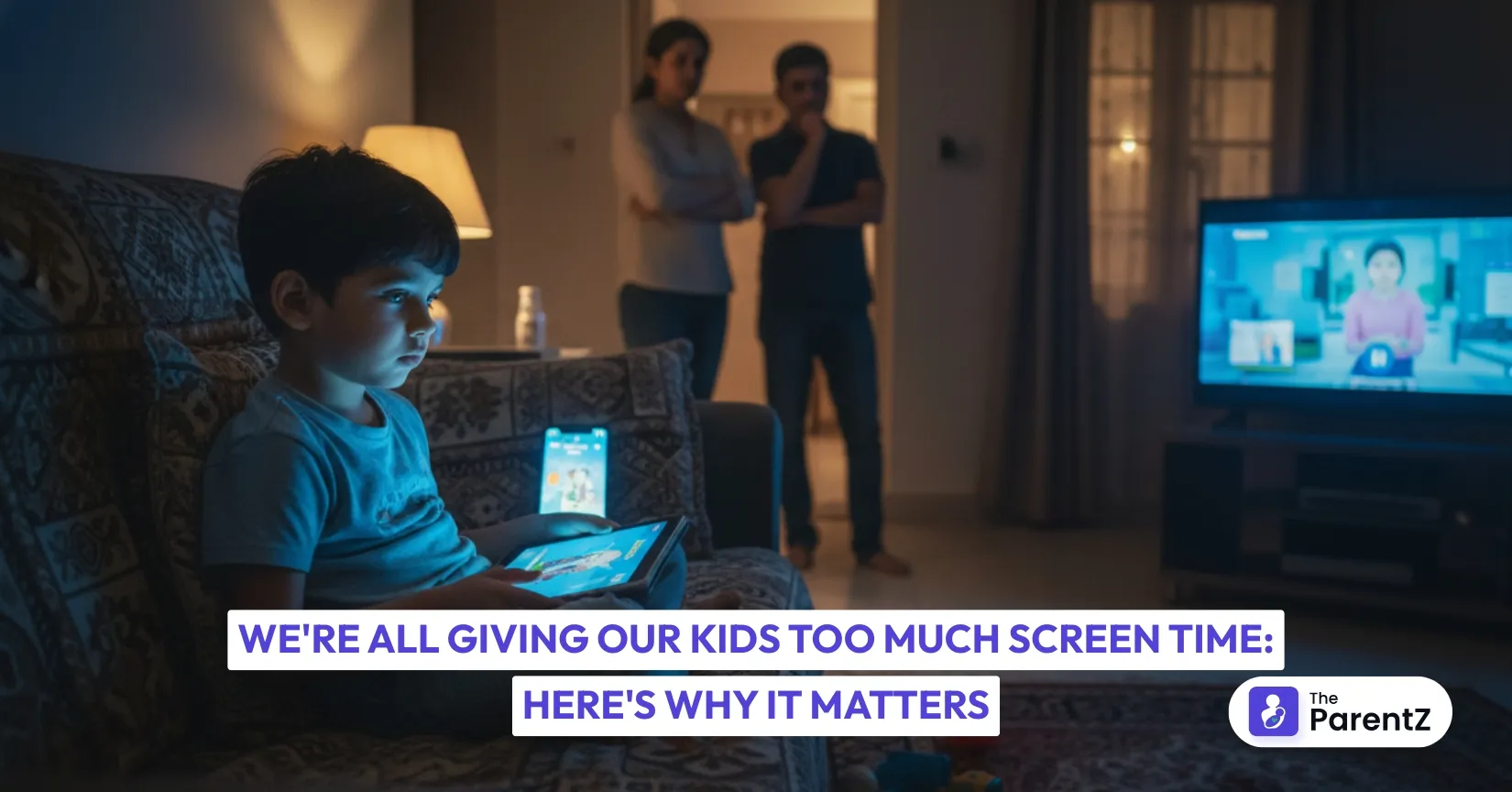Ever handed your phone to your toddler just to get five minutes of peace? Maybe during dinner, a tantrum, or while you finish that one important call? It’s something almost every parent has done. But here’s the eye-opener: according to a new study by researchers at AIIMS Raipur, children under 5 in India are spending about 2.22 hours a day on screens. That’s double the safe limit recommended by experts.
For children under two, screen time should be zero. For children aged 2 to 5, it should be under 1 hour a day, according to the Indian Academy of Pediatrics (IAP). But in reality, many children are spending much more, and not always because parents don’t care. Most of the time, it’s just how modern life has become.
How We Got Here?
Phones, tablets, and TVs are everywhere now, so much so that it’s hard to tell when screen time starts and real life pauses. Parents are busier, gadgets are cheaper, and kids learn fast. Before you know it, a baby knows how to skip ads before learning to tie their shoes.
And screens can be helpful. They calm kids, keep them occupied, or even teach a few things. But when screens become a daily babysitter, trouble starts. Studies link long screen use at a young age to slower language growth, poorer focus, sleep problems, and even weight gain.
Yet, knowing this still doesn’t make it easy to cut down. Especially when you’re juggling work, chores, and constant energy bursts from your little one.
Why This Matters?
You might think two hours a day isn’t much, but in the early years, every minute counts. This is the age when children learn to talk, think, and connect with people around them. The more they interact with screens, the less they interact with you, nature, and the world, which builds real skills.
Doctors point out that around 60 to 70 percent of Indian children under five now exceed safe screen limits. That’s a big number. Many kids can’t sleep without watching cartoons, eat only when a show is playing, or panic when the phone is taken away. These are not small signs; they show how deep the habit is setting in.
Children don’t just copy what we say; they copy what we do. If they see us constantly scrolling, they’ll naturally want to do the same. That’s why the change starts with us, not just with a rule about screen time.
What Doesn’t Work?
Every parent has heard common advice like “limit screen time” or “keep devices away.” But in real homes, where a child cries, meals are running late, and work calls can’t wait, those tips often sound impossible. It’s not that parents don’t care; it’s just that life gets hectic.
What works better is practical, flexible steps that fit real family routines and don’t leave anyone feeling guilty.
Tips That Actually Help
Here are some small but effective changes that work in homes with kids:
- Make specific no-screen zones: Keep screens out of bedrooms and dining areas. Once your child gets used to it, it’ll feel normal. You’ll notice calmer meals and better sleep almost instantly.
- Use tech swaps, not bans: Instead of saying “no phone,” replace it with something fun, like a quick story, bubbles, or coloring. The goal isn’t to take away screens overnight but to fill that space with something real.
- Plan short screen breaks together: If your child has already watched for 30 minutes, call for a “dance break” or “balcony break.” Kids love short words like that, and you can turn it into a family game.
- Watch together when you can: Co-watch if possible. It turns screen time into bonding time. You can talk about what’s happening on screen so it stays interactive, not passive.
- Don’t use screens as pacifiers: It’s tempting to hand over a phone to calm a crying child, but that teaches them comfort equals screen. Try a hug, music, or outdoor air first.
- Set your own limits: Children are sharp observers. If they see you keeping your phone aside during meals or bedtime, they’ll learn that too.
- Stick to calm routines before sleep: Avoid any screens an hour before bedtime. Instead, switch to stories, gentle music, or quiet play.
- Turn boredom into creativity: Boredom isn’t bad; it sparks imagination. Let them get “bored.” That’s when the best towers, pretend kitchens, and silly games appear.
- Include grandparents and babysitters: Make sure everyone who spends time with your child knows your approach. Consistency matters more than strict rules.
It’s Not About Guilt, It’s About Balance
No parent should feel guilty for having used screens. Every child has been calmed by a cartoon, and every parent deserves a breather. The goal isn’t to remove technology completely; it’s to make it work for your family, not control it.
Try thinking of screens like sweets. A little is fine, especially when shared. Too much, too often, spoils the appetite for other things. When screen use is balanced with active play, conversations, and outdoor time, the difference shows quickly as children sleep better, talk more, and handle emotions better.
Conclusion
Change starts small but spreads fast. Parents talking about screen balance at schools, doctors reminding families about limits during visits, and grandparents joining the effort; all of this helps.
The goal is simple: raise children who can handle screens without getting hooked on them. Because real childhood isn’t on a screen; it’s in the stories, the laughter, the run-around moments, and the messy play that can never be downloaded.





Be the first one to comment on this story.